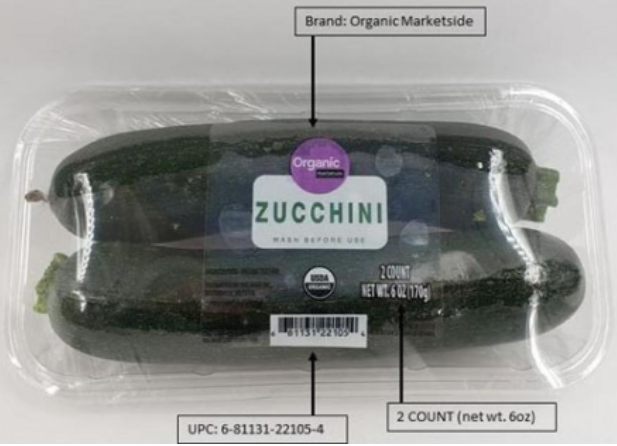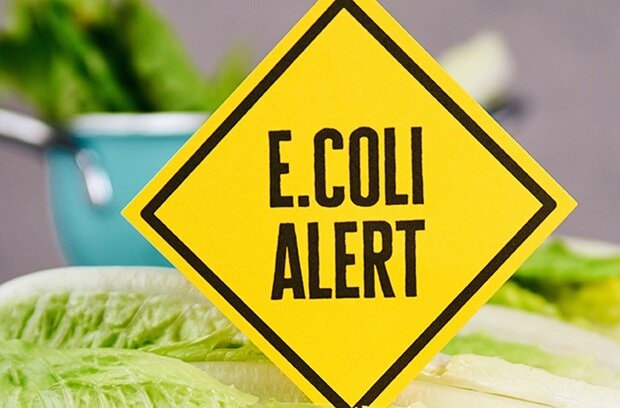The FDA reported that World Variety Produce, Inc.( Los Angeles, CA) recalled Organic Zucchini because it has the potential to be contaminated with Salmonella. Organic Marketside Zucchini were distributed through select Walmart retail stores in Arizona, Arkansas, Illinois, Indiana, Iowa, Kansas, Kentucky, Louisiana, Michigan, Minnesota, Mississippi, Missouri, Nebraska, North Dakota, Oklahoma, South Dakota, Texas, and Wisconsin. The recall was initiated because a single lot of imported organic zucchini tested positive for Salmonella due to a routine FDA sampling. @ https://www.fda.gov/safety/recalls-market-withdrawals-safety-alerts/world-variety-produce-inc-voluntarily-recalls-organic-zucchini-because-possible-health-risk
ruth
World Variety Produce, Inc. of Los Angeles, CA is voluntarily recalling case lot #38706503 of Organic Zucchini, because it has the potential to be contaminated with Salmonella, an organism which can cause serious and sometimes fatal infections in young children, frail or elderly people, and others w
ruth
The National Antimicrobial Resistance Monitoring System (NARMS) released the NARMS Integrated Summary 2019. NARMS is a national public health system that monitors pathogens in human and animal samples for resistance to antimicrobial drugs used in human and veterinary medicine. The NARMS Integrated Summary 2019 combines antimicrobial resistance data in bacteria isolated from humans (by CDC), raw retail meats (by FDA), and animals at slaughter (by USDA) to examine trends in resistance to the most important antimicrobial agents. The data from 2019 showed that 78% of Salmonella isolates collected from humans were not resistant to any of the antimicrobials. In humans, the overall resistance level remains relatively unchanged from 2018 and is in line with other data from 2006 to 2017, where 76–85% of Salmonella tested were susceptible to all antimicrobials. @ https://www.fda.gov/animal-veterinary/cvm-updates/fda-releases-narms-integrated-summary-2019?utm_medium=email&utm_source=govdelivery
NARMS Integrated Summary 2019 reports on trends in antimicrobial resistance in bacterial samples isolated from humans, raw retail meats, and animals.
The USDA ARS published a study examining a population of 181 strains of STEC over 23 years from a closed-system feedlot. (Weinroth, M.D., Clawson, M.L., Arthur, T.M. et al. Rates of evolutionary change of resident Escherichia coli O157:H7 differ within the same ecological niche. BMC Genomics 23, 275 (2022)). All strains were subjected to short-read sequencing, with a subset of 36 also subjected to long-read sequencing. The goal of the study was to understand how STEC O157:H7 evolve over time and offer context into strain relatedness in foodborne illness outbreak investigations. Over 23 years, four main clades of STEC O157:H7 were present within the feedlot, each recovered over a time span of at least a decade. @ https://bmcgenomics.biomedcentral.com/articles/10.1186/s12864-022-08497-6#Sec11
Background Shiga toxin-producing Escherichia coli (STEC) O157:H7 is a pathogen known to reside in cattle feedlots. This retrospective study examined 181 STEC O157:H7 strains collected over 23 years from a closed-system feedlot. All strains were subjected to short-read sequencing, with a subset of 36 also subjected to long-read sequencing. Results Over 96% of the strains fell into four phylogenetically distinct clades. Clade membership was associated with multiple factors including stx composition and the alleles of a well-characterized polymorphism (tir 255 T > A). Small plasmids (2.7 to 40 kb) were found to be primarily clade specific. Within each clade, chromosomal rearrangements were observed along with a core phageome and clade specific phages. Across both core and mobile elements of the genome, multiple SNP alleles were in complete linkage disequilibrium across all strains within specific clades. Clade evolutionary rates varied between 0.9 and 2.8 SNP/genome/year with two tir A allele clades having the lowest evolutionary rates. Investigation into possible causes of the differing rates was not conclusive but revealed a synonymous based mutation in the DNA polymerase III of the fastest evolving clade. Phylogenetic trees generated through our bioinformatic pipeline versus the NCBI’s pathogen detection project were similar, with the two tir A allele clades matching individual NCBI SNP clusters, and the two tir T allele clades assigned to multiple closely-related SNP clusters. Conclusions In one ecological niche, a diverse STEC O157:H7 population exhibited different rates of evolution that associated with SNP alleles in linkage disequilibrium in the core genome and mobile elements, including tir 255 T > A.
ruth
Prosecutors in France searched a Buitoni frozen pizza factory in Caudry, France, because the factory is suspected to be the source of an E. coli outbreak that caused dozens of children to become sick and the headquarters of its owner Nestle France. An investigation into involuntary manslaughter and deceitful practices was opened on 1 April after authorities found more than 70 infections and the potential death of a one-year-old and an 18-year-old. Nestle France, whose headquarters outside Paris were also raided. The inspection revealed a deterioration of food hygiene controls, rodents’ presence, and insufficient measures to prevent pests from contaminating a food production site. French authorities say the reports the outbreak might have begun to occur in late February. Recalls were also ordered in Belgium and Luxembourg, with the affected pizzas distributed in 20 other countries, including 15 in Africa, according to the EU’s Rapid Alert System for Food and Feed. @ https://www.firstpost.com/world/france-prosecutors-raid-nestle-owned-pizza-factory-after-e-coli-outbreak-leaves-dozens-of-children-sick-10553251.html
The inspections ‘revealed a deterioration of food hygiene controls’, the presence of ‘rodents’ and insufficient measures to prevent pests from contaminating a food production site, authorities said




